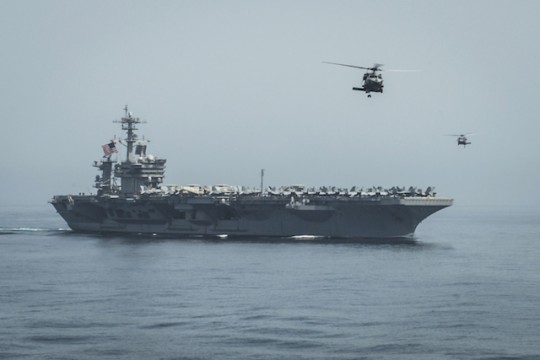Readers of the New York Times could be forgiven for believing that the Obama administration is maintaining a tough military posture in the Middle East. Consider today's report, courtesy of Helene Cooper, from the decks of the aircraft carrier Theodore Roosevelt, where Cooper portrays the Navy as maintaining a vigilant, tense watch on Iranian activity in the Persian Gulf:
Sometimes it seems like a game of chicken — only with risks so high that a single misstep could unravel what has been a tenuous standoff between the United States and Iran for 36 years.
But for the Obama administration, the American naval presence off Iranian shores is now more important than ever as the administration seeks to assure Middle Eastern allies and a skeptical Congress that the United States will continue to keep an eye on Iran.
The crew of the Roosevelt's task force are no doubt doing an excellent job. But nowhere in Cooper's report is it mentioned that, in a few weeks, the Roosevelt is leaving the Persian Gulf, not to be replaced by another American carrier for months. The Hill's Kristina Wong explains:
A U.S. official said the reduced presence isn’t from lack of need, but due to fewer carriers available and the prioritization of the Asia-Pacific.
"All I can say is that in the short-term, we need a continuous presence. The demand is out there, the [combatant commander] is asking for it, and the [Pacific Command] commander is asking for it. They’re asking for it. There’s just not enough peanut butter to spread around," the official said.
"So what are you going to do? You’re going to give what you can. You’re going to prioritize based on what the president wants us to do, what the [Defense] secretary wants us to do and allocate those forces to meet those needs," the official said.
So, if the American presence in the Gulf is important to "assure Middle Eastern allies" that we will "keep an eye on Iran," how reassuring is it that there will be no significant presence in the Gulf at precisely the moment the nuclear deal is meant to go into effect?
And how reassuring is it that, the same week that the foreign ministers of Russia and Iran meet in Moscow and announce that they represent a "united position" in Syria, the United States says it will pull its Patriot missile units off of the Turkish border with Syria? It is true that the United States has recently struck a deal with Turkey to use aircraft based at Incirlik to target the Islamic State, but the withdrawal of the missiles is still significant, because unlike the jets, the Patriot systems could only be used to defend against whatever's left of Assad's aircraft and missiles—or whatever is added to them in the future, now that Assad's backer, Iran, will have a lot more cash on hand. Pulling the Patriot missiles out has the effect of indicating that Assad's Tehran-backed regime isn't an American concern.
Everywhere you look, the administration fights what it sees as the real war, the war for American public opinion. It works to placate public unease about the consequences of its withdrawal from the world and its comfort with the rise of regional powers like Iran by portraying itself in the press as taking tough action. Meanwhile, its actual policies don't live up to the tough talk.
The press is, more often than not, complicit. Consider the coverage in recent days about the deployment of a group of Marines to Bulgaria to serve as a "deterrent" against Putin. The headline in the Marine Corps Times is characteristic: "Marine Corps sends tanks, weapons to Eastern Europe." That sounds pretty serious! Until you get to the details:
The Marine Corps shipped four Abrams main battle tanks, three howitzer artillery cannons and six light armored reconnaissance vehicles to the Combined Arms Company on Sunday, said Capt. Richard Ulsh, a spokesman for Marine Corps Forces Europe.
Four tanks. Four. It's a nice gesture. But that's all it is. It is true that there is also currently about a brigade's worth of American armor scattered around Eastern Europe, but a brigade scattered over an area that big is laughable as a deterrent.
The extremely limited posture is the real guide to the intentions of the U.S. government. Does anyone really believe that if Putin suddenly seized territory from a NATO member state like Estonia, President Obama would take military action, even if a token number of American troops were caught up in a Russian advance?
Nobody wants war, but the appearance of weakness makes war more, not less, likely. It's not clear that anyone at a senior level of the American government understands this foundational, centuries-old strategic idea. Take, for example, this alarming anecdote from Helene Cooper's report on the operations of the Theodore Roosevelt:
Crew members on the Iranian ship pointed a heavy machine gun at the American helicopter, an alarming provocation at a time when critics are trying to kill a nuclear deal limiting Iran’s nuclear program in exchange for sanctions relief. The American helicopter, following standing orders to defuse tensions instead of elevating them, took off from the ship, but the Iranian crew continued to track it with the gun for a few moments before turning away.
Then the report took a strange turn. During the entire episode, Vice Adm. John W. Miller, the Fifth Fleet commander, was told that an Iranian film crew aboard the frigate was videotaping everything. "The whole thing took a couple of minutes," Admiral Miller said later, recounting his surprise at the film crew. "We have no idea why they were filming it."
Let me hazard a guess: They were filming, for propaganda purposes, how American military men withdraw from the scene when you point a weapon at them.
